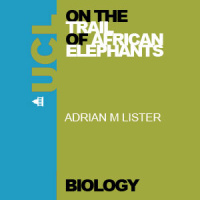Best Of Natural History Radio
- Author: Vários
- Narrator: Vários
- Publisher: Podcast
- Duration: 147:19:52
- More information
Informações:
Synopsis
The BBC Natural History Unit produces a wide range of programmes that aim to immerse a listener in the wonder, surprise and importance that nature has to offer.
Episodes
-
Saving Species 2 Programme 14
26/07/2011 Duration: 28min14/30 Chris the cuckoo is south bound, heading for Africa - but where exactly is he? We visit the British Trust for Ornithology's HQ in East Anglia and find out latest progress of him and his compatriots. We also have a report about the UK Lady Bird Survey being conducted by the Biological Records Centre. Over recent years we have heard much about the invasive harlequin ladybird pushing out our native species - but is this really the case. And how easy is it to see all the ladybrid species found in the British Isles? We'll be encouraging you to join in and if you don't know your ladybirds, why not use ispot.
-
Saving Species Series 2 Episode 13
19/07/2011 Duration: 28minBrett Westwood presents. Ponds in the UK are the target for significant conservation measures, but how well have we done looking after the wildlife of these mini wetlands? We talk to Natural England on the future of Biodiversity Action Plans (BAPs). Also in the programme we feature the latest report from Bob Swann surveying the seabird colonies of Tain and Canna. And a report from Newcastle from Trai Anfield on the future of urban nesting Kittiwakes who are being re-located to breeding towers on the River Tyne. With news from Kelvin Boot.
-
Saving Species 2 Programme 12
12/07/2011 Duration: 28minBrett Westwood presents. Saving Species has an interview with Sperm Whale biologist Hal Whitehead and reports live from the International Whale Commission. We also have a report on wetlands in England and an interview from Kenya on the status of Giraffes. Giraffe numbers have been falling in Africa - why?
-
Saving Species 2 Programme 11
05/07/2011 Duration: 27min11/30 The Green Turtle is one of nature's great travellers, migrating from feeding grounds to breeding grounds traversing the oceans of the world. Like so many species reported in the series, Green Turtles are in decline. Our reporter James Brickell reports from the Great Barrier Reef with biologists who are both trying to understand the natural history of these magnificent creatures and help in their conservation. And we have turtle biologist Brendan Godley from Exeter University live in the studio. We'll have an update from the two Beavers we're following in Devon - Chris Sperring has been down to visit the site and to see the Beavers. And how is Chris the Cuckoo doing? We'll be spying in on his migration south. Presenter: Brett Westwood Producer: Sheena Duncan Editor: Julian Hector
-
Saving Species 2 Programme 10 28-Jun-11
28/06/2011 Duration: 28min10/30 This week in the Saving Species studio we have Lucy Hawkes visiting who is a biologist working on the Bar-Headed Goose. The Bar-Headed goose is famous for its high altitude migration, climbing from the lowlands of India, over and above the highest peaks of the Himalayas, to their breeding grounds on the high altitude grasslands of Outer Mongolia. We also talk to Daniel Pauly, a leading marine biologist from University of British Columbia, about his take on the state of global oceans - And get out with Michael Scott on an Earth Watch expedition looking for whales around the British coastline. Presenter: Brett Westwood Producer: Mary Colwell Editor: Julian Hector
-
Saving Species 2 Programme 9 21-Jun-11
21/06/2011 Duration: 28minAs part of the Saving Species mini-series "Citizen Conservation", presented by Sarah Pitt, there is a feature on the conservation of Dormice. It seems that one of the most important habitats to protect for Dormice is "scrub". But what is scrub? Also in the programme is a report on the status of the Manx Shearwater seabirds, recorded on location on Canna near the Isle of Skye by Bob Swann. Followed by an interview with the RSPB about the role of controlling predators to protect seabird chicks. Other subjects also in the programme include Large Blue Butterflies with Matthew Oates; plus the latest on the Cuckoos the BTO have attached special transmitters too, reported in an earlier edition of Saving Species. Presenter: Brett Westwood Producer: Mary Colwell Editor: Julian Hector
-
Savnig Species Series 2 Programme 8
14/06/2011 Duration: 28min8/30 Britain is internationally important for seabird species. There are colonies of Gannets, Fulmars, Manx Shearwaters, Puffins, Guillemots, Razor Bills, Greater Black-backed Gulls and Storm Petrels to name just a few. In recent years there have been reports that the breeding success of British seabirds is in decline although unusually cold winters in the last two years might have slowed this decline. To find out the latest about the UK's seabird populations Brett Westwood will be on the Farne Islands, with guests - And live with the National Trust from the Long Nanny Arctic Tern colony. Kelvin Boot will be in the Saving Species studio in Bristol. Presenter: Kelvin Boot Producer: Mary Colwell Editor: Julian Hector
-
Saving Species Series 2 Programme 7
08/06/2011 Duration: 27minThis week's Saving Species explores the mysteries of bird migration. Joanna Pinnock joins the British Trust for Ornithology on an early morning expedition to put a special transmitter on a Cuckoo. Chris Sperring is in Somerset finding out about the fortune of the pied flycatcher, and Mark Brazil reports from the northern Japanese island of Hokkaido on the little understood Latham's Snipe. Presenter: Brett Westwood, Producer: Sheena Duncan, Editor: Julian Hector.
-
Saving Species 2 Programme 6
31/05/2011 Duration: 28minSaving Species reports the extraordinary findings of a twenty year study into the wildlife of a garden. Presented by Joanna Pinnock
-
Saving Species 2 Programme 5
24/05/2011 Duration: 28minSaving Species is in front of an audience on the Tyntesfield Estate near Bristol – it’s here, care of the National Trust, a BioBlitz is taking place. Saving Species asks the question, “where are tomorrows naturalists going to come from”?
-
Living World - Raft Spiders
22/05/2011 Duration: 21minPresenter Paul Evans meets up with John Hughes from the Shropshire Wildlife Trust to traverse Wem Moss National Nature Reserve in search of a wetland specialist, the raft spider Dolomedes fimbriatus: Britain's largest native spider.
-
Saving Species 2 Programme 4
17/05/2011 Duration: 28minBrett Westwood presents. Saving Species reports from a project in Norfolk restoring an ancient wood. We feature a report from Bob Swann who has monitored the same two seabird colonies in Scotland for 25 years. Patrick Evans reads his second piece from the area around Chernobyl - this week we hear about the Przewalski's Horse. Produced by Mary Colwell, Editor: Julian Hector.
-
Living World - Oil Beetles
15/05/2011 Duration: 22minDevon is home to all four oil beetle species recorded in Britain. For this weeks' Living World, Paul Evans joins naturalist John Walters on an oil beetle hunt.
-
Saving Species 2 Programme 3
10/05/2011 Duration: 28minSaving Species reports from the Congo and the future of Lowland Gorilla's and the translocation of Desert Tortoises in the Mojave desert. Plus, how has the UK wildlife reacted to this years most unusual spring - high seasonal temperatures, very low rainfall and habitat fires.
-
Living World - Dymock Daffodils
08/05/2011 Duration: 22minPaul Evans follows the Poet's Path into the heart of wild daffodil country as he celebrates spring in the Dymock woods in Gloucestershire, home to the Dymock Poets in WW1.
-
Saving Species 2 Programme 2
04/05/2011 Duration: 28minThe re-introduction of European Beavers into the British countryside continues to be a long and complex consultation process, with many Beavers now in large habitat-scale enclosures. Plus the first report from journalist Patrick Evans on the state of wildlife in the Chernobyl Exclusion Zone.
-
Living World - Islay Birds
01/05/2011 Duration: 22minIslay is a haven for birds. For this weeks' Living World, Michael Scott joins long time Islay resident Malcolm Ogilvie for a birdwatch along the shores of Loch Gruinart.
-
Saving Species 2 Programme 1
27/04/2011 Duration: 27minSaving Species is back for another year of live broadcasting about the world of wildlife conservation. The first programme is a reminder that spring has sprung and the UK's most treasured migrant birds are back - the Swallows. During the winter a BBC Natural History Unit team visited Nigeria to track down a little know population of wintering swallows - and they found them. With upward of five million individuals, the sky darkened with the swirling avian biomass. We reveal how we know East Anglia is the destination of some of these West African Swallows are migrating to.
-
James And The Giant Eagle
22/04/2011 Duration: 27minJames Aldred encounters one of the world's most powerful birds of prey, the Harpy Eagle.
-
Living World - The Brown Hare
24/02/2011 Duration: 22minLionel Kelleway meets Gill Turner, who has observed the behaviour of brown hares for the last 15 years to explore this question. Together, they marvel at the antics of the brown hare - one of the first signs of Spring - on a very special farm in Hertfordshire.





























